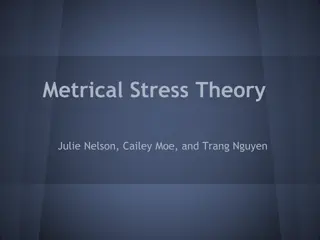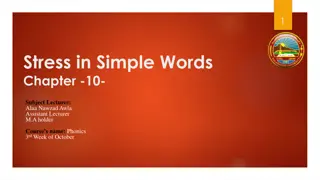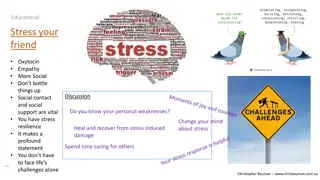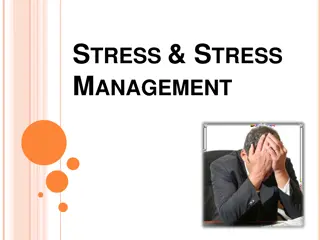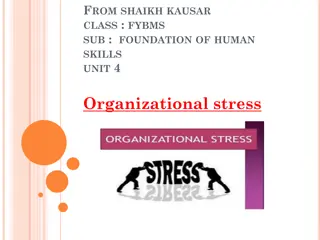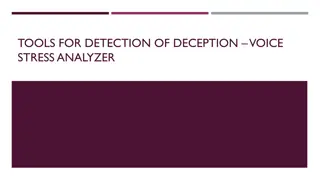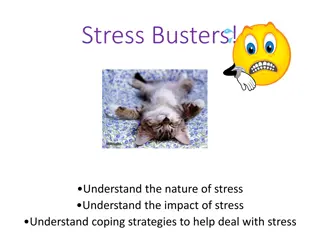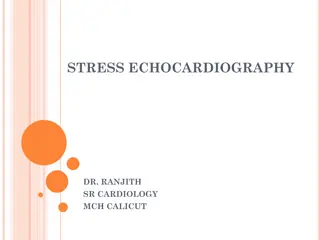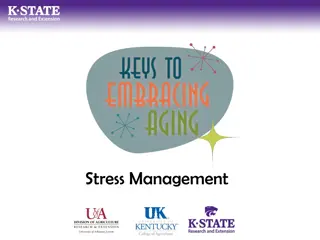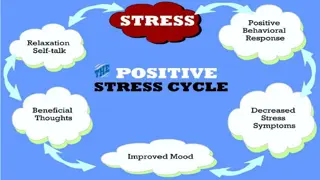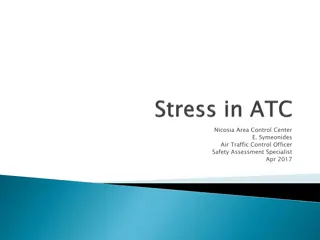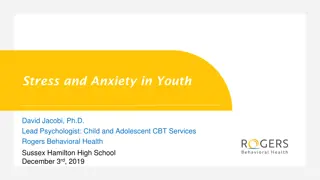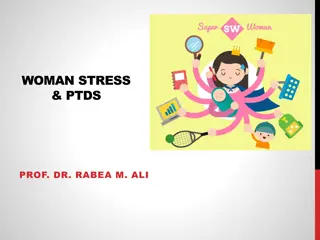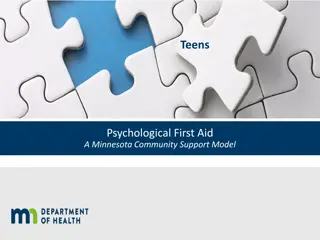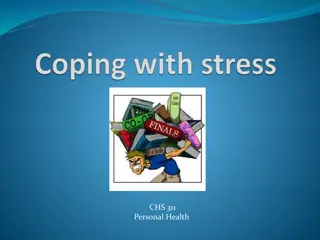Understanding Stress and Its Main Causes
Stress is a natural response to challenging events in life. Positive stress, known as eustress, promotes growth, while negative stress, distress, can be harmful. Major life changes, catastrophes, everyday problems, and environmental factors can all contribute to stress levels. Recognizing these causes is essential for managing stress effectively.
Download Presentation

Please find below an Image/Link to download the presentation.
The content on the website is provided AS IS for your information and personal use only. It may not be sold, licensed, or shared on other websites without obtaining consent from the author. Download presentation by click this link. If you encounter any issues during the download, it is possible that the publisher has removed the file from their server.
E N D
Presentation Transcript
Managing Stress Ch. 3
1 - What Causes Stress S Why does the ringing of an alarm clock cause you to experience stress? S Stress is a response of your body and mind to threatening or challenging events in your life. S An event or situation that causes stress is called a stressor.
Positive and Negative Stress S Positive stress is also known as eustress. This form promotes growth and accomplishment. S Negative stress is sometimes called distress. S Think about something you accomplished lately maybe you did well on a test or performed well in a game. Think about the feelings you experienced before and during the event.
4 Main Causes of Stress S 1. Major Life Changes Fig. 1 (p. 57) lists some significant stressors identified by high school students. They include: graduating from high school, experiencing death of a parent, going through parents divorce, experiencing remarriage of parent, having a newborn sister or brother, having a serious illness, moving to a new school district, failing a grade, etc. Most of them are major life changes, especially ones that affect one s family or school life. They are stressful because they threaten the person s sense of security or self-esteem.
4 Main Causes of Stress S 2. Catastrophe is unexpected event that threatens lives and may destroy property. Natural disaster such as hurricanes, floods, and tornados are catastrophes. So are violent crimes, terrorism, and war. A person who experiences catastrophe may deal with the physiological effects for years after the event.
4 Main Causes of Stress (Cont d) S 3. Everyday Problems Some of the most common stressors are minor and are known as Hassles . This includes misplacing or losing something, missing your bus, being concerned with looks, or having too many things to do at once. While they seem minor, they occur day in and day out.
4 Main Causes of Stress (Cont d) S 4. Environmental (Physical) Surroundings Conditions in your immediate surroundings can affect your level of stress each day. Ex: Traveling to school on a crowded bus. A major stressor that is often overlooked is, noise. People who live in noisy environments show signs of high stress levels. Weather conditions can also be stressful such as snow, heat, earthquakes, and fires.
2 How Stress Affects the Body S All stressors trigger the same response. However, the intensity of the response will vary. S The body s response to stress occurs in three stages the Alarm Stage, the Resistance Stage, and the Exhaustion Stage.
3 Stages of Stress S 1. Alarm Stage When your body perceives something to be a threat to your safety, it springs into action automatically. Adrenaline is a hormone released in response to fear or stress. S During the Alarm Stage, you experience increase in your breathing rate, heart rate, and blood pressure. S Fight or Flight Response is the initial reaction of the body to stress during the Alarm Stage.
3 Stages of Stress S 2. Resistance Stage If the stressor continues, you enter this state. Your body adapts to the continued presence of the stressor. The body uses up a lot of energy so you may become tired, irritable, and less able to handle any additional stress.
3 Stages of Stress S 3. Exhaustion Stage the body can no longer keep up with the demands placed on it. Your physical and emotional resources are depleted. This stage does not occur with each stress response. It only occurs if the stressor continues for a long time. (weeks, months, years)
Recognizing Signs of Stress S Look at Fig. 5 p. 62 S This describes many warning signs that are behavioral, physical, emotional, or changes in thinking. S After you recognize the warning signs of stress, you should try to identify the stressor. S By recognizing signs as early as possible and by identifying stressors, you may be able to prevent the more serious effects of stress.
Stress and Illness S Severe or prolonged stress can affect your health. Stress can trigger certain illnesses, reduce the body s ability to fight an illness, and make some diseases harder to control. S Stomachaches, Asthma, Headaches, and Heart Disease (the silent killer) can all be caused by stress on the body. S Ulcers are usually NOT an illness caused by stress.
Stress and Illness S Prolonged stress can cause the immune system to function worse than usual. S Reducing stress is one of the ways that people can lower their blood pressure and reduce the risk of heart disease.
3 Stress and Individuals S Responses to stress vary. How you react to a stressor does NOT depend on the way other people react. S Different people often have different responses to the same stressor.
3 Stress and Individuals S Stress and Personality Your personality has a lot to do with how you respond to stressors. S Optimism is the tendency to focus on the positive aspects of a situation. S Pessimism is the tendency to focus on the negative and expect the worst. S Perfectionist is person who accepts nothing less that excellence. S Look at Figure 8 on p. 66
3 Stress and Individuals S Resilience is the ability to recover or bounce back from extreme or prolonged stress. S A resilient person views stressful events as challenges. S Resilient people are able to recognize and control their feelings. S The key factor in resilience is having the support of family and friends. These relationships offer encouragement, reassurance, and love. S Look on p. 67
4 -- Coping with Stress S Many people think that all stress is out of their control. You can do many things to keep stress under control. S 2 techniques that can help you keep stress under control are time management and mental rehearsal. S Time Management is one of the biggest contributors to stress. Putting things off to the last minute can increase stress. S Mental Rehearsal is when you practice an event without actually doing the event. It takes place in your mind to help give yourself confidence. (Ex. singer or athlete)
4 --Coping with Stress S When your general health is good, you are better able to deal with stressful situations. S One of the best ways to deal with extreme or prolonged stress is to build a support system to build your resilience. S Resilience is the ability to recover from extreme or prolonged stress. S During a major life change, sticking to your routines can help build your resilience. S A good strategy for building resilience is confiding in yourself by writing in a journal.
4 --Coping with Stress S When you try many different stress management techniques (p. 75) and nothing seems to work, the best option is to try each stress-management technique again. S Good examples of people to ask to help with your problems include your parents, a friend, a teacher, but not a stranger. S Sharing your problems with someone you can trust can help you see them more clearly.



